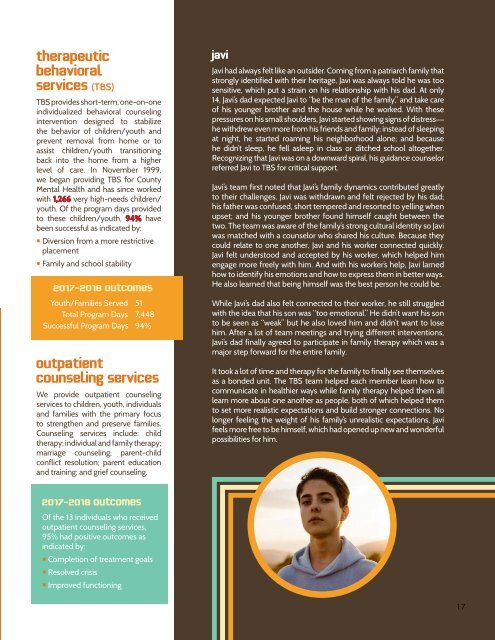Family Care Network Annual Report
Family Care Network, Inc. Annual Report for the 2017-2018 fiscal year.
Family Care Network, Inc. Annual Report for the 2017-2018 fiscal year.
Create successful ePaper yourself
Turn your PDF publications into a flip-book with our unique Google optimized e-Paper software.
therapeutic<br />
behavioral<br />
services (TBS)<br />
TBS provides short-term, one-on-one<br />
individualized behavioral counseling<br />
intervention designed to stabilize<br />
the behavior of children/youth and<br />
prevent removal from home or to<br />
assist children/youth transitioning<br />
back into the home from a higher<br />
level of care. In November 1999,<br />
we began providing TBS for County<br />
Mental Health and has since worked<br />
with 1,266 very high-needs children/<br />
youth. Of the program days provided<br />
to these children/youth, 94% have<br />
been successful as indicated by:<br />
• Diversion from a more restrictive<br />
placement<br />
• <strong>Family</strong> and school stability<br />
2017-2018 Outcomes<br />
Youth/Families Served 51<br />
Total Program Days 7,448<br />
Successful Program Days 94%<br />
outpatient<br />
counseling services<br />
We provide outpatient counseling<br />
services to children, youth, individuals<br />
and families with the primary focus<br />
to strengthen and preserve families.<br />
Counseling services include: child<br />
therapy; individual and family therapy;<br />
marriage counseling; parent-child<br />
conflict resolution; parent education<br />
and training; and grief counseling.<br />
javi<br />
Javi had always felt like an outsider. Coming from a patriarch family that<br />
strongly identified with their heritage, Javi was always told he was too<br />
sensitive, which put a strain on his relationship with his dad. At only<br />
14, Javi’s dad expected Javi to “be the man of the family,” and take care<br />
of his younger brother and the house while he worked. With these<br />
pressures on his small shoulders, Javi started showing signs of distress—<br />
he withdrew even more from his friends and family; instead of sleeping<br />
at night, he started roaming his neighborhood alone; and because<br />
he didn’t sleep, he fell asleep in class or ditched school altogether.<br />
Recognizing that Javi was on a downward spiral, his guidance counselor<br />
referred Javi to TBS for critical support.<br />
Javi’s team first noted that Javi’s family dynamics contributed greatly<br />
to their challenges. Javi was withdrawn and felt rejected by his dad;<br />
his father was confused, short tempered and resorted to yelling when<br />
upset; and his younger brother found himself caught between the<br />
two. The team was aware of the family’s strong cultural identity so Javi<br />
was matched with a counselor who shared his culture. Because they<br />
could relate to one another, Javi and his worker connected quickly.<br />
Javi felt understood and accepted by his worker, which helped him<br />
engage more freely with him. And with his worker’s help, Javi larned<br />
how to identify his emotions and how to express them in better ways.<br />
He also learned that being himself was the best person he could be.<br />
While Javi’s dad also felt connected to their worker, he still struggled<br />
with the idea that his son was “too emotional.” He didn’t want his son<br />
to be seen as “weak” but he also loved him and didn’t want to lose<br />
him. After a lot of team meetings and trying different interventions,<br />
Javi’s dad finally agreed to participate in family therapy which was a<br />
major step forward for the entire family.<br />
It took a lot of time and therapy for the family to finally see themselves<br />
as a bonded unit. The TBS team helped each member learn how to<br />
communicate in healthier ways while family therapy helped them all<br />
learn more about one another as people, both of which helped them<br />
to set more realistic expectations and build stronger connections. No<br />
longer feeling the weight of his family’s unrealistic expectations, Javi<br />
feels more free to be himself, which had opened up new and wonderful<br />
possibilities for him.<br />
2017-2018 Outcomes<br />
Of the 13 individuals who received<br />
outpatient counseling services,<br />
95% had positive outcomes as<br />
indicated by:<br />
• Completion of treatment goals<br />
• Resolved crisis<br />
• Improved functioning<br />
17



